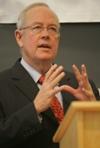Starr Sees Current Court In Historic Hamiltonian-Jeffersonian Tug
Starr Sees Current Court In Historic Hamiltonian-Jeffersonian Tug
Kenneth Starr Says Justices Kennedy and Alito Influencing Roberts’ Court
The Former Whitewater Independent Counsel and Current Pepperdine Law Dean Sees Kennedy and Alito’s decisions favoring national government’s powers
By MIRIAM FURMAN
February 15, 2008 (NEW YORK) - The recent Supreme Court opinions of Justices Anthony Kennedy and Samuel Alito tend to favor the federal government’s authority rather than that of the states, said Kenneth Starr, former Independent Counsel during the Clinton-era Whitewater investigation. Starr, currently dean and law professor at Pepperdine University School of Law in Malibu, Calif., made his assessment of the current Supreme Court during an address today at Columbia Law School. His visit was sponsored by the Law School’s Federalist Society, an organization of politically conservative students.
Starr placed Justices Kennedy and Alito’s opinions during the 2006 session into the context of a broader, timeworn struggle the Court has faced since the Constitution’s ratification. There’s the Hamiltonian view, which favors a strong, central government. And there’s the Jeffersonian belief in the sovereignty of the states.
Chief Justice John Roberts is still winning most cases, said Starr, but Justices Kennedy and Alito are often taking more of a nationalist view in their decisions than Roberts’ narrow opinions favor. To back his analysis, Starr discussed the justices’ opinions in several of last term’s cases involving issues such as free speech in public schools, interstate commerce and bank regulation.
“The potential alliance between Kennedy and Alito is worth noting,” Starr said. These two justices have found the Hamiltonian way. They are lifting up the primacy of national institutions, and like Alexander Hamilton, during the country’s early days, “becoming suspicious of state and local power,” Starr said.
Hamilton wanted a strong central government when he voted to ratify the Constitution in 1787, but others did not. “Of all of the founders, Hamilton had the greatest doubt about the wisdom of the people. Hamilton’s faith in Americans never quite matched his faith in America,” Starr said.
Starr has been a judge for the U.S. Court of Appeals, D.C. Circuit, and was Solicitor General of the U.S., a position that enabled him to argue 25 cases before the Supreme Court.
The theory and rationale during this year’s hotly contested presidential primaries over the function of super delegates also reflect concern about the potential influence of ordinary people, in this case, delegates, said Starr, who repeated what he said he heard on TV recently: “‘Super delegates were created by the Democrats in 1972 to dampen the ardor of the liberals.’”
They’re delegates who are more likely to represent the interests of the party nationally, rather than the interests of voters who favor upstarts, he explained. “It’s possible that Obama may command more of the popular vote in the Democratic primaries,” he said, “but super-delegates could give the nomination to Clinton, the establishment candidate.”
During a reception following the program, Starr told students he believes in the primary system because it brings the candidates closer to the people.
